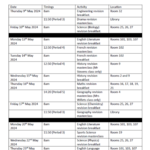Applying to a collegeThere are a number of key events in place to support Year 11's with their college applications. These include assemblies with education and training providers, subject evenings and a post 16 transition evening. In addition to this all year 11 students will receive impartial advice and guidance through a 1:1 careers interview with ‘CXK’ Students will be given an action plan, identifying key points about what needs to be done to get the ball rolling with applications. They will also take part in careers related workshops with ‘Ask Apprenticeships’ and a mock job interview with a local employer. Students should discuss their post 16 options and college applications with their parent / carer. All students are expected to apply to college through Careers East Sussex Students receive a personal log-in to complete their profile and submit their applications, Support is available in Life Education lessons and after school drop-in sessions. Mrs Starkey also has an open door policy at break and lunchtimes for any questions. Students with SEND are also supported by the Assistant Inclusion Manager, who is available to attend 1:1 interviews with students and assist them with completing their applications. If you have any queries, please do not hesitate to contact Mrs Starkey (Director of Learning - KS4) dstarkey@ryecollege.co.uk. |
Applying to College Documents
Apprenticeships
An apprenticeship is a skilled job with training. Every apprentice is guaranteed a minimum wage linked to their age. They're available at all academic levels - whether you're leaving school without GCSEs or completing your A-levels. There are apprenticeships in industries like engineering, health and accountancy - plus a host of careers you'd never think of. And 9 in 10 apprentices stay in work after completing their course.
Higher Apprenticeships
A higher apprenticeships is your ticket to a high-skilled job. You'll usually need at least 2 A-levels to start one, and you'll come out with qualifications equivalent to a foundation degree or higher - with any tuition fees paid by your employer! Higher apprentices can earn between £300-500 per week (although you may start lower). You could train to be a solicitor or a lab scientist, and even learn how to design sweets with a confectionery apprenticeship!
Degree Apprenticeship
Degree apprenticeships guarantee you a university degree, as well as on-the-job training for a high-skilled job. You'll spend 30 hours a week learning from experienced colleagues at work, and the equivalent of one day studying towards a bachelor's or master's degree at uni or college. It gives you the kudos and academic grounding of a degree along with sought-after employability skills employers say graduates don't have. And 8 out of 10 parents think it's better than an Oxbridge degree!
Should I apply for an Apprenticeship or University?
Today, apprenticeships offer a route into high-skilled jobs that you had to go to uni to train for in the past. If you know what career path you want to follow, an apprenticeship could get you there without the fees - while enabling you to develop employability skills too. University is essential for certain careers and great for those with passionate academic interests. Carefully consider the pros and cons of both university and apprenticeships before making your decision.
Depending on the apprenticeship offered, you can earn money while being trained on the job AND get qualifications including a degree, A-levels, NVQs, etc.
You don't need to be a tradesman if you don't want to, there are many different types of apprenticeship.
There are more apprenticeships available now than ever before.
An introduction to Apprenticeships 2023
View The Apprentice Story film to discover more about the exciting world of Apprenticeships.
.jpg)
_(1)_(1).jpg)



